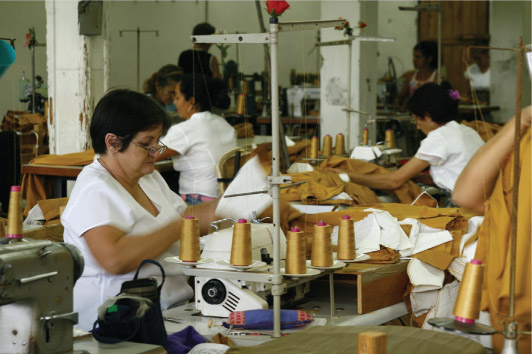18.5 Social responsibility and sustainability in supply chains
Companies around the world are having discussions about the need to audit and the check the practices of suppliers. There have been a number of incidents involving employees in factories in Asia. Questions have been raised about conditions and the responsibility of large organisations.
DEVELOPING YOUR UNDERSTANDING 18.4
Read the extract and answer the questions below.
Extract one
Unilever is a large global multinational corporation based in the Netherlands and the United Kingdom. Its main business centres on food and beverage, personal and household goods and health care. Unilever is one of the largest buyers of palm oil using around 3% of the world’s volume which is used in a range of products such as margarine, cereals and cosmetics. More than 80% of palm oil is produced in Indonesia and Malaysia and this has caused high levels of deforestation.
The company looked at ways to ensure that palm oil was sourced from sustainable sources. In 2008 Greenpeace accused the company of being involved in unethical and unsustainable practices causing environmental degradation. Unilever conducted an investigation and found that Greenpeace’s allegations were true. The company then developed a policy to purchase all palm oil from certified sustainable sources.
Source 18.13 Extract based on an article on Unilever and sustainable sourcing of palm oil
Extract two

Investors are calling for greater transparency from public companies over the sourcing of clothing, footwear and textiles from Asia, warning that chasing cheaper labour to reduce costs can backfire and ultimately damage fashion brands.
The pressure was on public companies to provide more information on sourcing, including details of which countries they were buying goods from, and audits to ensure no child or slave labour was used.
Last week it was alleged that Qantas had bought airline headphones from a Chinese jail where prisoners were regularly beaten and held in solitary confinement for missing production targets.
Source 18.14 Extract based on the article ‘Pressure on retailers to act ethically’
Extract three
Coca-Cola Amatil says it is cooperating with authorities who are investigating whether the company’s Indonesian bottling unit has been taking water without proper permits for more than 3 years. The company has been under investigation since September when it emerged that the company has been tapping wells even through water permits expired in 2010.
The company has denied it acted illegally stating it has been trying to renew or extend the permits but the process has been held up. It believed that putting an application in meant it was able to continue to operate the wells.
Source 18.15 Extract based on the article ‘Indonesian Coke bottler to cooperate with probe into water issues’
- Identify a common theme among the three extracts.
- Explain one piece or information you have gained from each extract.
- Why is it important for companies to ensure they are acting in an ethical manner in other countries?
In 2013 the global textiles industry was put under enormous pressure to improve the conditions of workers in India and around the globe, following the collapse of the Rana Plaza factory in Bangladesh. The factory collapse killed 1138 people and injured approximately 2000.